British doctor's death in Syria no suicide, family says
updated 10:05 PM EST, Tue December 17, 2013
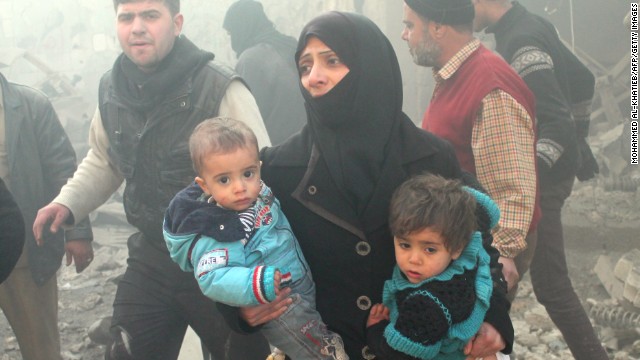
Barrel bombs kill 83 in Syria air raid
STORY HIGHLIGHTS
- British doctor's brother calls suicide report "absolute slander"
- Abbas Khan had been expected to return to Britain by Christmas
- He had been held since November 2012 for entering Syria without a visa
- Another day of "barrel bombs" pounds Aleppo; dozens killed
The 32-year-old
orthopedic surgeon was arrested for entering Syria without a visa more
than a year ago after volunteering to treat wounded victims of that
country's civil war. After his mother personally pleaded with top Syrian
officials to free him, they appeared to have relented. A member of the
House of Commons, George Galloway, was planning to fly to Damascus to
bring him home on Friday.
Instead, his family was
told that Khan was dead by his own hand, found hanging in his cell -- a
report his brother called "absolute slander" Tuesday.
"All the signs were that
they were teeing him up for release ... and now somehow, in a shroud of
mystery, he's just hung himself," the brother, Shah Nawaz Khan, told
CNN. "It makes no sense."
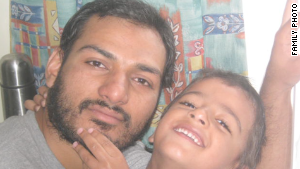
Abbas Khan, pictured with his son Abdullah, had volunteered to treat wounded victims.
Their grief came as
Syrian government aircraft pounded the city where Khan was arrested for a
third day, killing more than 70 people, opposition activists reported.
Khan had been
volunteering in Aleppo, the country's largest city, when he was taken
into custody in November 2012, his brother said. He had always wanted to
put his medical degree to work for relief agencies, and began working
with a charity in Turkey that summer, his brother said.
"There's no suggestion he was there for anything other than just humanitarian causes," he said.
'I think he's been silenced'
Khan was on his second
trip into Syria, having crossed the border through a checkpoint manned
by the rebel Free Syrian Army when he was arrested, Shah Nawaz Khan
said.
"It may be naive, but he
understood some of the risks there, to help people on the ground
there," he said. "He worked 40 hours nonstop, operating on critically
injured individuals, saving the lives of women and children."
Then he "disappeared off
the radar." His family learned of his arrest six months later via
diplomats from India, their ancestral home, Shah Nawaz Khan told CNN.
His mother flew to
Damascus, where she "rung every bell, knocked on every door and
groveled" in an attempt to secure his release. Syrian officials
eventually transferred Khan from military custody to a civilian lockup,
where his mother was allowed to visit, Shah Nawaz Khan said.
He was emaciated and
showed "clear signs of maltreatment," but his condition had improved
before his transfer. He wrote letters home "almost every other day," the
last telling them his release appeared to be in the works.
Instead, they were told Monday that he had killed himself.
"It's just trying to
defend them against the indefensible," Shah Nawaz Khan said. "He's been
summarily executed without trial or due process ... I think he's been
silenced for whatever he might have to say."
In a statement posted
online Tuesday, Galloway -- the fiery leftist and political celebrity --
said he had been working with Syrian officials for months to try to
secure Khan's release and had been scheduled to bring him home from
Damascus at week's end.
"I think we will have to
wait for clarification on how exactly he died, but this is
heartbreaking and devastating news for his family who have been working
so hard for so long to secure his release," he said. "Particularly
because his freedom had been agreed and he was due to return with me in
the next few days. My sincere condolences go out to his family, whose
pain is unbearable."
There was no immediate comment on Khan's death from Syrian government agencies.
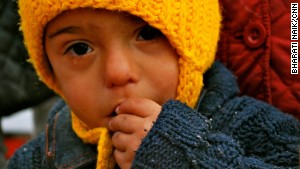 Syrian refugees face snow, freezing temps
Syrian refugees face snow, freezing temps
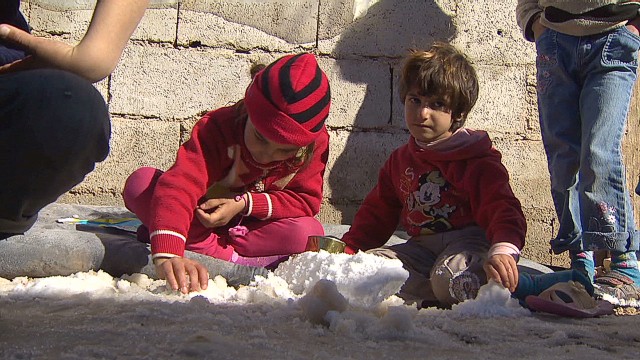 UN refugee agency renews Syria appeal
UN refugee agency renews Syria appeal
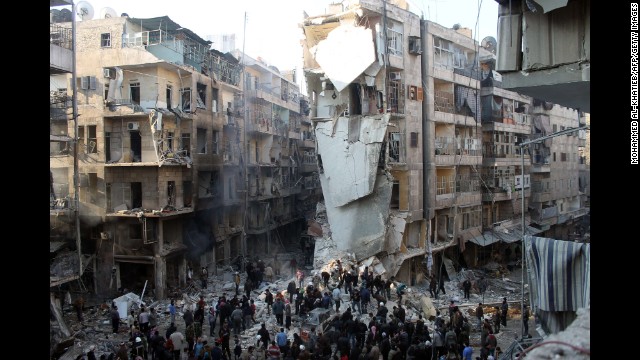 Syrian civil war in photos
Syrian civil war in photos
From metropolis to battlefield
More than 100,000 people
have been killed in Syria's nearly 3-year-old civil war, according to
the United Nations. In Aleppo, the relief agency Doctors Without Borders
said hospitals have been "overwhelmed" by casualties after waves of
airstrikes using so-called barrel bombs: drums packed with explosives
and shrapnel and dropped by helicopters.
"For the past three
days, the helicopters have been targeting different areas, among them a
school and the Haydarya roundabout, where people wait for public
transport vehicles," said Aitor Zabalgogeazkoa, a Doctors Without
Borders coordinator in Syria. "In both cases, there were dozens of dead
and injured people. A dozen bodies were being lined up in front of three
hospitals waiting to be recovered by the families."
By Tuesday, new attacks
had killed 73 people, including five children, bringing the three-day
toll to 212, according to the opposition Local Coordination Committees
of Syria.
The state-run Syrian
Arab News Agency did not explicitly mention the use of barrel bombs
Tuesday, but said "armed terrorist groups were entirely eliminated" in
several parts of Aleppo. State media often describes opposition forces
bent out ousting President Bashar al-Assad as "terrorists."
Tuesday's carnage
follows two days of intense bloodshed in what was once Syria's economic
hub. At least 83 people were killed Sunday by aerial bombing in Aleppo,
including 27 children, the LCC said. Another 56 people died there Monday
from similar attacks, the dissident group said.
Entire buildings have been flattened in the blasts, the opposition Syrian National Coalition said.
U.S. State Department spokeswoman Marie Harf decried the alleged use of barrel bombs.
"We strongly condemn the
latest development from over the weekend that the Assad regime has
dropped barrel bombs in and around Aleppo, killing dozens, including
women and children," she said.
"These bombs and the
explosive materials contained within them further underscore the
brutality of the Assad regime and the lengths they will go to attack and
kill their own people."
Syria's descent into
civil war began in March 2011, when Assad's regime forcefully cracked
down on peaceful anti-government protesters.
CNN's Neda Farshbaf contributed to this report.
No comments:
Post a Comment
Please leave a comment-- or suggestions, particularly of topics and places you'd like to see covered